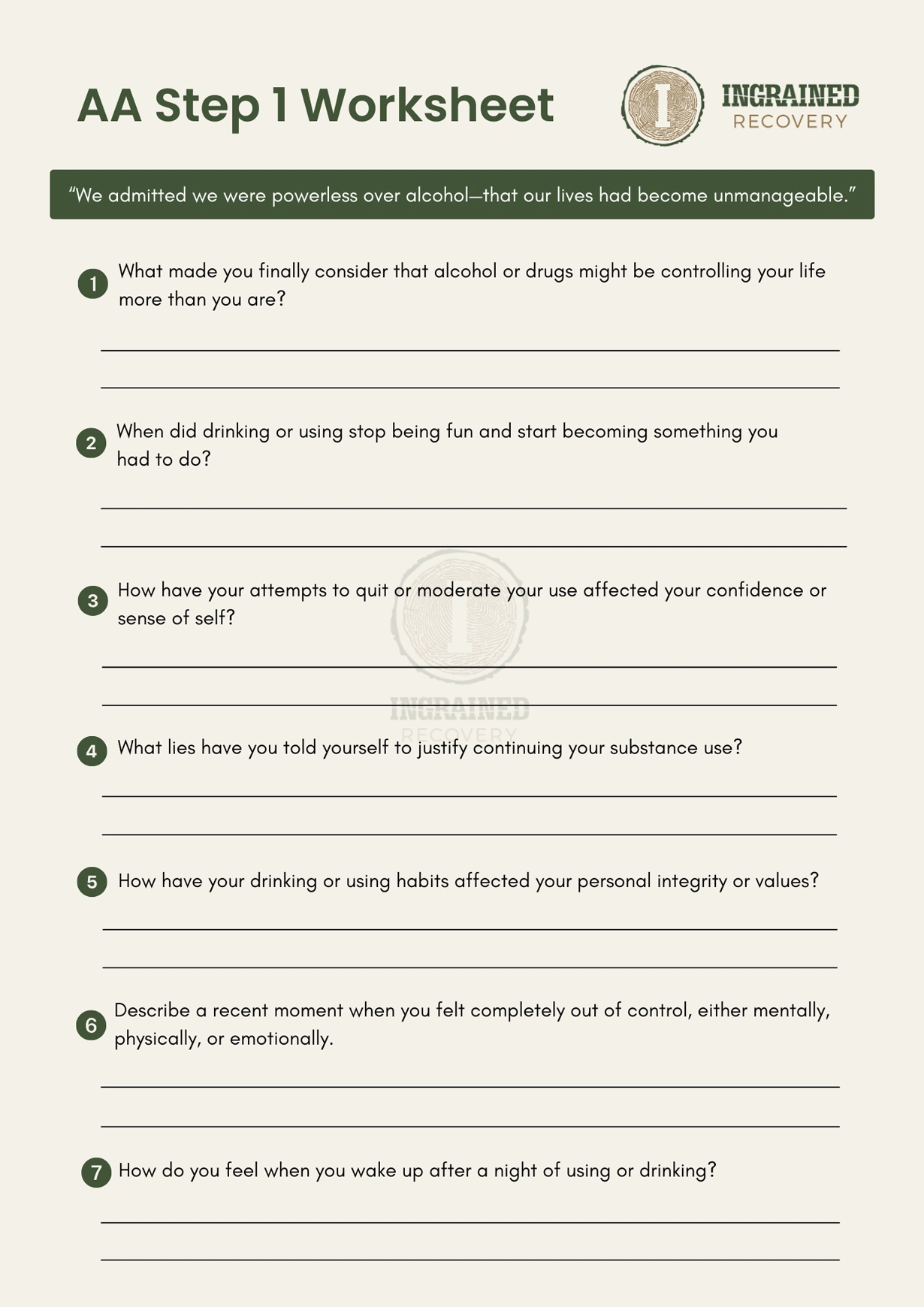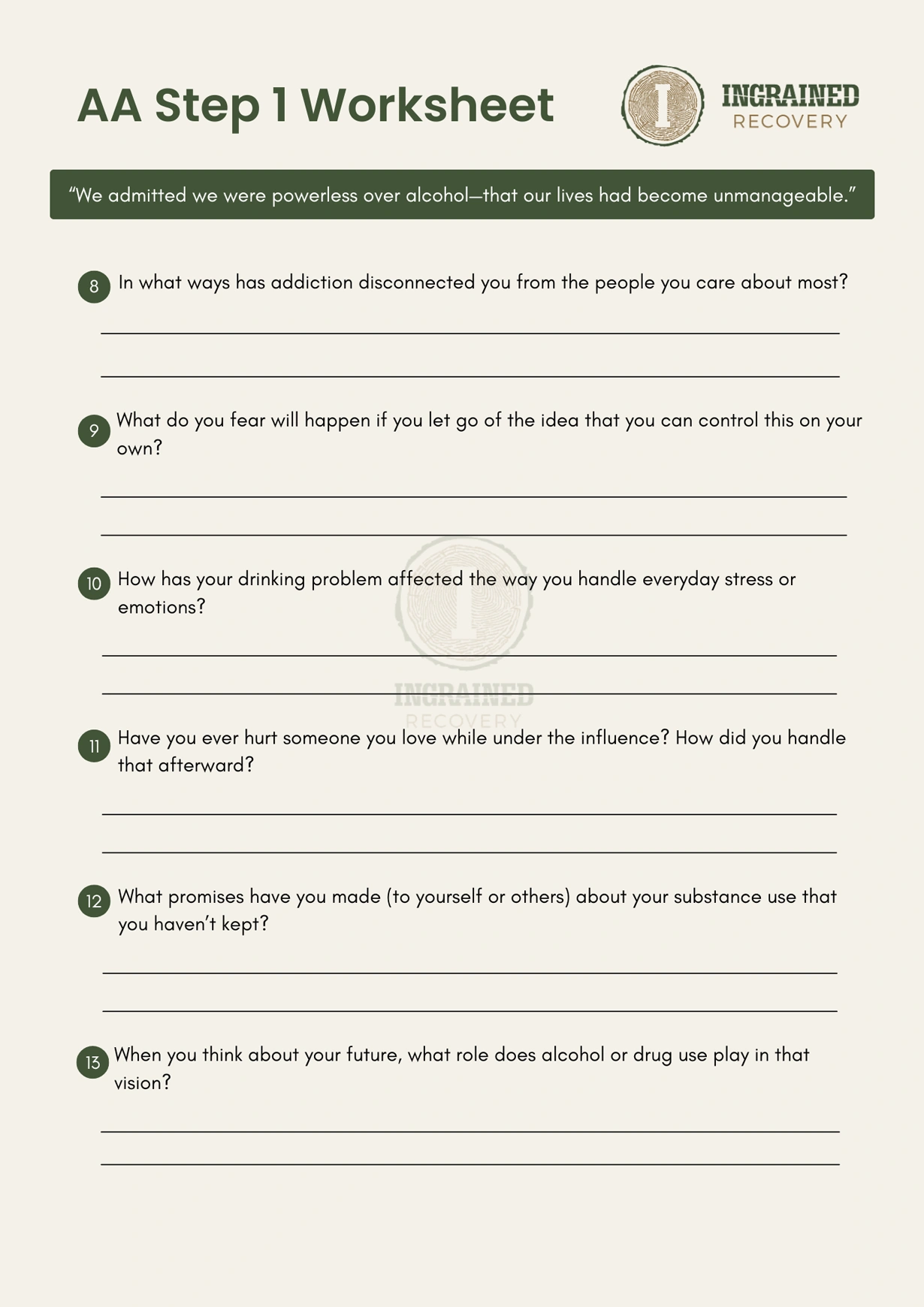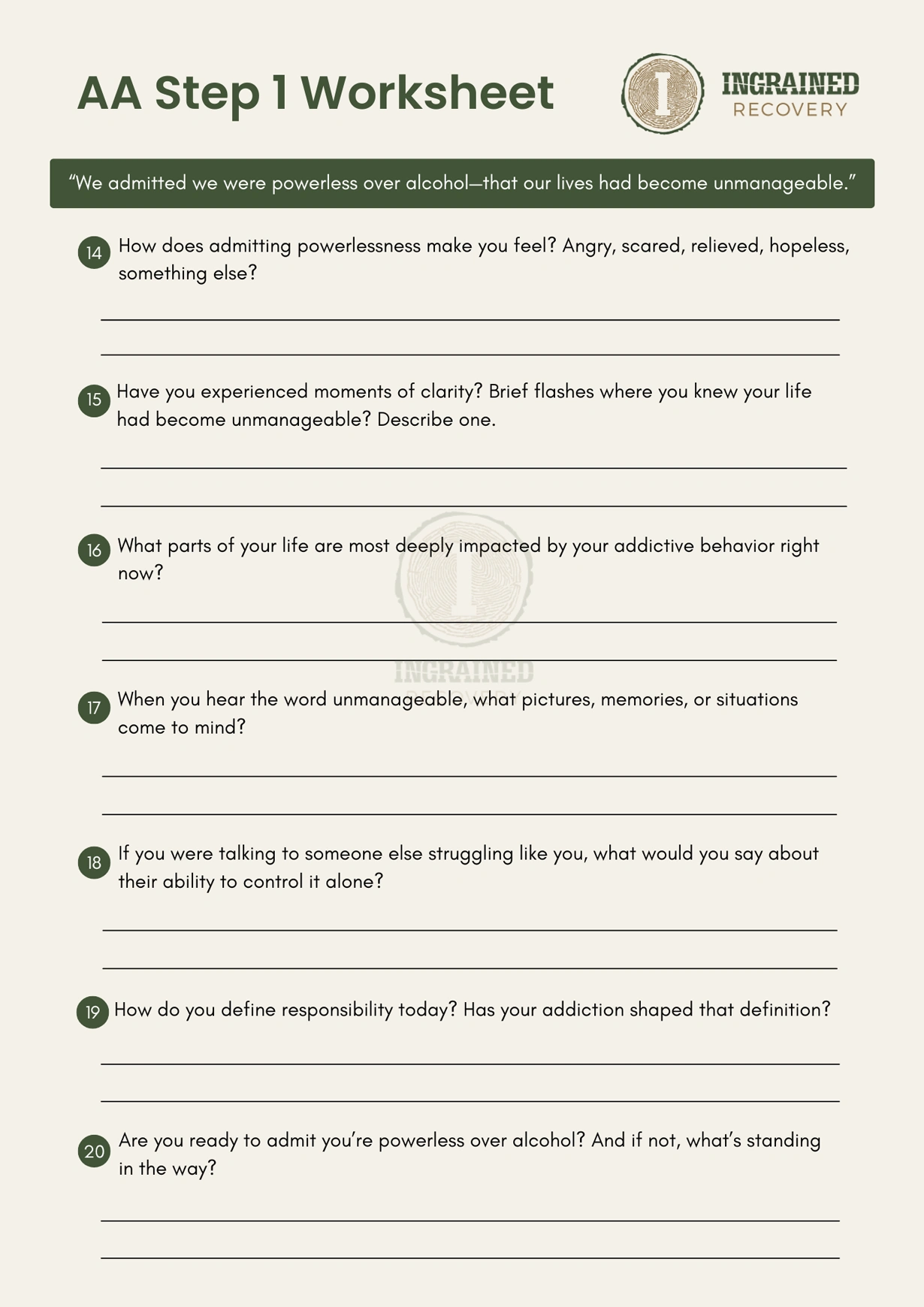Working the First Step in Your Alcoholics Anonymous Program
I know how it feels to find yourself on the path to addiction. You didn’t mean for it to go this far. Maybe it started with one drink to take the edge off. One line to stay up. One pill to bring you down. But somewhere along the way, that one turned into too many. Now you’re here. Tired. Angry. Numb. And wondering if anything can really change.
AA Step One begins with the pain you can’t ignore anymore. And the AA Step One Worksheet we have put together at Ingrained Recovery can be a major part of working this part of the program fully.
AA Step One doesn’t ask you to change your whole life overnight. It doesn’t ask you to be perfect or strong. It asks for one thing: honesty. The kind of honesty that hurts in the beginning. Then it frees you in the end. You just need to admit the truth you’ve known in your bones for a while now.
Keep reading to learn more about this foundational element of the Twelve Steps, and get a roadmap to working Step 1 successfully from our incredible staff at Ingrained Recovery.
Get Accredited Treatment Programs at Ingrained Recovery

Admitted We Were Powerless, and Our Lives Had Become Unmanageable
That’s it. That’s the beginning. It sounds simple. But you already know that it’s not easy. It might be the hardest part of the whole recovery process. But it’s also the most important.
At Ingrained Recovery in Georgia, we understand the weight behind those words. And we’re here to walk with you through it. Step One isn’t just a saying. It’s the door. And it’s wide open.
Admitting You’re Powerless Over Alcohol
“Admitted we were powerless over alcohol, that our lives had become unmanageable.” That’s how it is written in the Big Book of Alcoholics Anonymous. Step One. You might’ve heard it in your first AA meeting. Maybe someone handed you the book and you read it late at night, still sweating from withdrawal. Maybe you weren’t ready yet. That’s okay.
Admitting you’re powerless doesn’t mean you’re weak. It means you’ve tried everything and nothing worked. You tried limiting your drinks. You tried only using on weekends. You told yourself this was the last time. But it never was. The addictive behavior continued, now perhaps with a dash of self loathing added to the mix.
Step One as a Way of Recognizing the Nature of Our Addictive Behavior
Addiction has a way of making promises it never keeps. And the longer you stay in it, the harder it becomes to separate the lies from the truth.
According to this study on the National Institute of Health website, the longer a person goes without attempting to recover, the harder it becomes for that person to succeed.
You don’t need to figure out how to fix everything. You just need to admit that on your own, you can’t. That’s what Step One is all about.
The idea of surrender can feel humiliating at first. But that’s just the ego talking. What you’re actually doing is telling the truth. This may be the first time in a long time. And once that truth is out, things start to shift.
Get Proven Detox and Rehab Options at Ingrained

The Unmanageability of Life Under Alcohol Addiction
It’s easy to say your life became unmanageable. It’s harder to describe what that actually looked like. You missed work again. You lied to someone who trusted you. You looked in the mirror and didn’t recognize the person staring back. That’s unmanageability.
It shows up in your finances. In your relationships. In the way your emotions stop making sense. You don’t cry when you should. You explode over nothing. You feel empty even when you’re surrounded by people. The consequences pile up. Your health. Your reputation. Your sense of purpose. But you still keep drinking. Or using. Or both.
What Makes a Life Unmanageable: Making a Consequences List
Unmanageability doesn’t always mean chaos on the outside. Sometimes it’s quiet. Private. Secret. But inside, the damage is the same. You’ve lost control, and that loss touches every part of your life. This study talks about how parts of the brain become damaged and this may be a reason managing life becomes so much more difficult.
That’s why Step One asks you to take a real inventory. What parts of your life have spun out of control? What have you lost? What are you afraid to lose next? This is where the healing starts. You admit the damage so you can begin the repair.
What Powerlessness Really Means
Powerless doesn’t mean hopeless. And it definitely doesn’t mean worthless. Powerless just means you can’t win this fight on your own. That’s a fact. Not a judgment. The disease of addiction works like that.
It tells you that you can handle it. That it’s not that bad. That you can quit any time. But if you’re reading this, you already know those aren’t true. When you finally admit you are powerless over alcohol, you’re not giving up, you’re giving in to the truth.
And when you stop lying to yourself, you create space for something new. Something real. Something stronger than addiction. That’s the point of Step One. You surrender the fight so you can begin the addiction recovery process.
Our AA Step 1 Worksheet: Creating Your Unmanageability List
The AA Step One worksheet is meant to help you reflect honestly on your relationship with alcohol and other substances. It’s not about getting it perfect. It’s about being willing to face the truth so you can begin to heal and face the addictive behaviors.
Use as much space as you need. Be honest, even if it’s uncomfortable. That discomfort is part of the healing process.
- What made you finally consider that alcohol or drugs might be controlling your life more than you are?
- When did drinking or using stop being fun and start becoming something you had to do?
- How have your attempts to quit or moderate your use affected your confidence or sense of self?
- What lies have you told yourself to justify continuing your substance use?
- How have your drinking or using habits affected your personal integrity or values?
- Describe a recent moment when you felt completely out of control, either mentally, physically, or emotionally.
- How do you feel when you wake up after a night of using or drinking?
- In what ways has addiction disconnected you from the people you care about most?
- What do you fear will happen if you let go of the idea that you can control this on your own?
- How has your drinking problem affected the way you handle everyday stress or emotions?
- Have you ever hurt someone you love while under the influence? How did you handle that afterward?
- What promises have you made (to yourself or others) about your substance use that you haven’t kept?
- When you think about your future, what role does alcohol or drug use play in that vision?
- How does admitting powerlessness make you feel? Angry, scared, relieved, hopeless, something else?
- Have you experienced moments of clarity? Brief flashes where you knew your life had become unmanageable? Describe one.
- What parts of your life are most deeply impacted by your addictive behavior right now?
- When you hear the word unmanageable, what pictures, memories, or situations come to mind?
- If you were talking to someone else struggling like you, what would you say about their ability to control it alone?
- How do you define responsibility today? Has your addiction shaped that definition?
- Are you ready to admit you’re powerless over alcohol? And if not, what’s standing in the way?
This worksheet is a tool to help you begin. You don’t need to have all the answers. You just need to start answering honestly. If you’re ready, bring what you’ve written into a group setting or share it with someone you trust. Step work is not meant to be done alone. It’s best to follow sponsor’s suggestions.
Use these answers as your foundation. They’re not about getting it right. They’re about getting real. This is your step. This is where the recovery process begins.
Your First Time Working the Step
If this is your first time working the AA Step One Worksheet, be gentle with yourself. Don’t rush. Don’t try to make it pretty. Just be honest. The first time you sit down to do the step work, it can feel overwhelming. You might feel raw. You might cry. You might feel nothing. All of that is okay.
This is your step. No one else’s. You don’t have to compare it to anyone else’s journey. There’s no wrong way to begin. Just start. If it helps, talk to someone in a group. Talk to your sponsor in Alcoholics Anonymous. Ask questions.
If this is your first AA meeting, tell someone. That one sentence can open up a world of support you didn’t know was there.
At Ingrained Recovery, we help guide you through this process. Step One isn’t just a theory. It’s something we live every day. And it’s something we can help you walk through, no matter how dark things feel right now.
The Power of a Higher Power

Step One opens the door to something greater. That’s where the higher power comes in. You don’t need to have a full understanding of God. You don’t even need to believe in religion. You just need a willingness to believe that something outside yourself might have more power than alcohol. More power than your addiction.
Your higher power can be your AA group. Your sponsor. The program itself. The universe. The feeling you get when you see your child’s face and want to do better. It doesn’t matter what form it takes. It matters that you begin to believe in something beyond your own broken will.
Your higher power is what makes recovery possible. You’ve already admitted that you can’t manage this on your own. That’s the first step. Now you begin to build trust in something greater than your addiction. That’s the beginning of a better life.
Taking Responsibility Without Shame
There’s a difference between guilt and responsibility. Guilt says you’re a bad person. Responsibility says you’re a person who made mistakes and can make different choices. That shift matters.
When you admit your powerlessness, you take responsibility for your life. Not in shame. But in strength. You admit the truth, and from there, you begin to build something new.
The program of Alcoholics Anonymous isn’t about tearing you down. It’s about building you back up from a place of truth. And that truth starts with you. It starts with Step One.
You’ll hear it over and over, both on its own and as the basis for core topics in AA meetings. “We admitted we were powerless over alcohol, that our lives had become unmanageable.”
It’s the phrase that changed everything for millions of alcoholics and people struggling with substance abuse. And it can change everything for you, too.
A New Life Starts with Step One

You don’t have to figure out the next eleven steps today. You just have to begin. Working Step One isn’t the end of your story. It’s the first time you get to write a new chapter. One where you’re not driven by addiction. One where you begin to regain control. One where support is available, and you’re not alone anymore.
You’ll feel fear. You’ll feel resistance. That’s normal. But you’ll also feel hope. And once you start to feel that hope, you’ll begin to see that a better life is possible.
You’re not broken beyond repair. Your story doesn’t end in darkness. It begins again, in light. At Ingrained Recovery, we help people like you take that first step toward sobriety every single day.
We know what it’s like to admit defeat. We also know what it’s like to find strength you didn’t think you had. No one in AA is guaranteed a spiritual awakening.
But we are given ‘the Promises,’ and told they will come true in our lives.
And at Ingrained, we’ve seen this come true time and time again, in our own lives and in the lives of our clients and others working a 12 Step program successfully.
Up To 100% of Rehab Costs Covered By Insurance
Get Support for 12 Step Success at Ingrained Today
The first step is just that, a beginning. But it’s the most important one you’ll take. If you’re ready to admit you’re powerless over alcohol and that your life has become unmanageable, then you’re ready to start the real recovery process.
At Ingrained Recovery, we specialize in helping people find a new way forward through our 12 step facilitation therapy. You will find compassion and peer support, as well as get support on overcoming the underlying causes of your drinking.
This is more than a treatment center. It’s a place to find yourself again. To feel again. To live again.
And it starts with one step.
If you are ready to stop just surviving and start living, reach out to Ingrained Recovery today. We take your anonymity and confidentiality seriously, so please don’t hesitate and reach out now.



